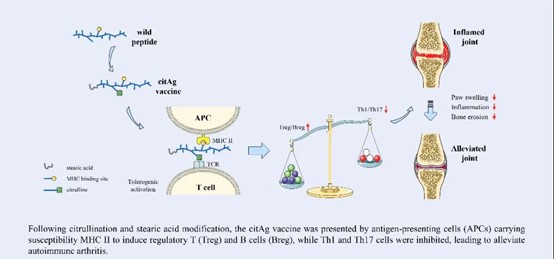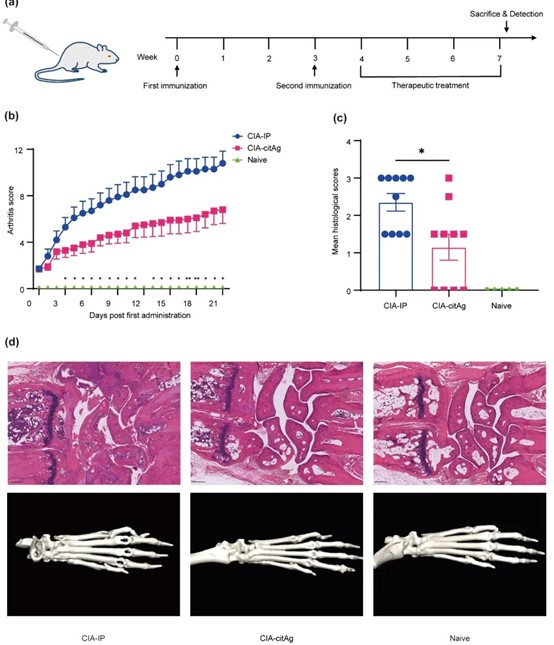Rheumatology and Immunology | New Joint Research Findings by Prof. Li Zhanguo and Prof. Hu Fanlei’s Team and the Institute of Psychology at CAS Published in Science Bulletin
栗占国、胡凡磊团队与中国科学院心理研究所合作研究成果在权威杂志发表
2024-10-17
Recently, the team led by Professor Li Zhanguo and Professor Hu Fanlei from the Department of Rheumatology and Immunology at Peking University People's Hospital (PKUPH), in collaboration with Professor Wang Jing’s team from the Institute of Psychology at the Chinese Academy of Sciences (CAS), published an online research paper titled "A Citrullinated Antigenic Vaccine in Treatment of Autoimmune Arthritis" in Science Bulletin (IF=18.8). The paper demonstrated that the citrullinated antigenic (citAg) vaccine might have a therapeutic effect on RA by targeting and eliminating/suppressing antigen-specific T/B cells.

Dr. Jin Xu from the Department of Rheumatology and Immunology at PKUPH and Peking-Tsinghua Center for Life Sciences is the first author of the paper. Professors Li Zhanguo and Hu Fanlei from PKUPH and Professor Wang Jing from CAS are the corresponding authors. Important contributions to the research were made by Engineer Fang Kechi and Dr. Dong Tianya from the Institute of Psychology at the CAS, Researcher Dong Suwei and Dr. Wang Qian from the School of Pharmaceutical Sciences at Peking University, and Researcher Zhong Chao from the School of Basic Medical Sciences at Peking University. The research has gained strong support from a number of official science foundation programs.
Autoimmune diseases affect approximately 10% of the population, with rising incidence rates. Most of these diseases are incurable and require long-term treatment. Rheumatoid arthritis (RA) is one of the most common autoimmune diseases, with patients’ systemic joints being attacked by an abnormally activated immune system and eventually damaged and disabled.

According to previous studies, the early stage of RA might be associated with mucosal inflammation induced by environmental factors, which leads to protein citrullination. Citrullinated protein could induce an immune response and lead to the production of anticitrullinated peptide antibodies (ACPAs), which are routinely detected for RA diagnosis. A high prevalence of autoantibodies against citrullinated CII was found in RA, suggesting that autoimmune responses to citrullinated CII are involved in the pathogenesis of RA. Citrullination alters the structure and enhances the antigenic properties of proteins. Therefore, the citrullinated neo-antigens presented by antigen-presenting cells (APCs) carrying susceptibility MHC II may activate T and B cells and trigger RA. The structural determination of the peptide-MHC II complex provided a molecular basis for the interaction between HLA-DRB1 and citrullinated CII.

The study showed that the citrullinated antigenic (citAg) vaccine ameliorated collagen-induced arthritis with decreased T-helper 1 (Th1) and Th17 cells, downregulated proinflammatory cytokines including interleukin-6 and tumor necrosis factor-α and inhibited antigen recall responses. B cell receptor sequencing further revealed that the citAg vaccine could dampen the dysregulated V(D)J recombination, restoring the immune repertoire.
In conclusion, the study revealed that antigen-based immunotherapy could restore immune tolerance, providing a novel treatment strategy for RA. It is expected that this strategy can be applied to RA treatment as soon as possible.
Paper Link: http://www.sciencedirect.com/science/article/pii/S2095927324005619

